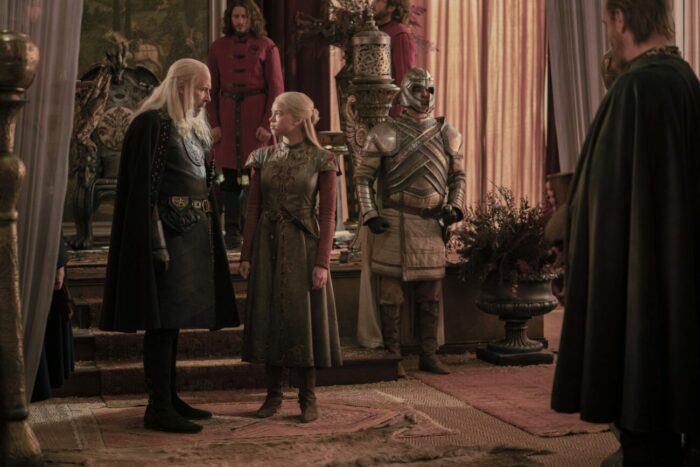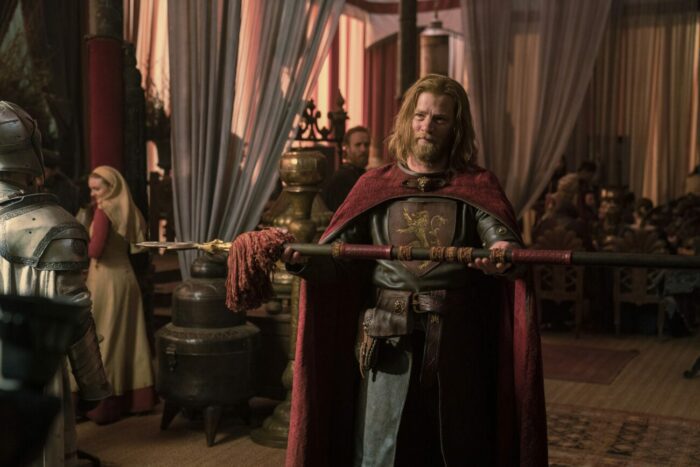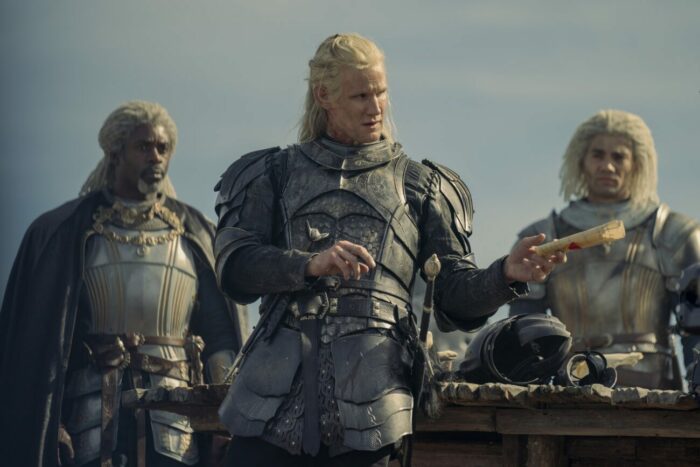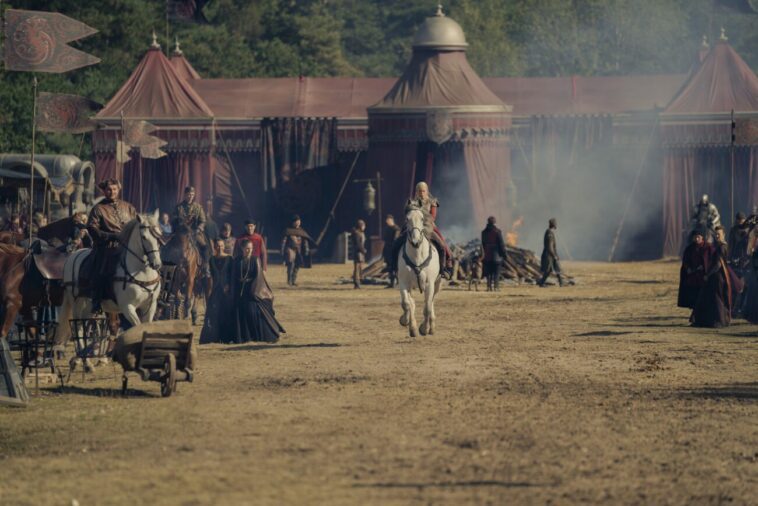The following contains spoilers for House of the Dragon S1E3, “Second of His Name” (written by Gabe Fonseca & Ryan J. Condal & George R.R. Martin and directed by Greg Yaitanes)
Three episodes in, House of the Dragon continues to be one of the most confounding shows I have ever watched. Most of the issues I’ve had with the show—the misogyny, the lack of investment in its characters, and one glaring misfire in the core cast—are still very much present, yet I continue to find myself entertained. I do think I’ve found out why House of the Dragon continues to entertain me against my better judgement: it is, for all intents and purposes, a Westerosi royalty slash high fantasy reality show—basically, Keeping Up With The Kardashians if that show ended with the Kardashians destroying each other in a civil war over who would succeed Kris as head of the family, where both sides have what amounts to highly trained, highly loyal, living, breathing nuclear weapons—and I don’t know about you, but if that’s how Keeping Up With The Kardashians ultimately ended I would consider it to absolutely be must see TV.
Episode 3 starts us off in the future—three years, to be precise. We knew in advance that there would be a big time jump around the midway point of the season with recastings for some key characters, but it looks like the rest of the season will feature other, smaller timeskips. These prove to be one of the show’s biggest double-edged swords: they absolutely help to keep things moving along at a fairly steady pace, but it also makes it all the more difficult to be invested in the fates of those involved. With Game of Thrones, people got invested in the characters in large part because we watched them grow and develop over literal years; with House of the Dragon, there’s huge chunks of each character’s arc that are only implied or talked about off-screen.
The effect is…jarring, to say the least. Some characters seem to hardly change over the course of the two year gap—Daemon and Corlys in particular seem frozen in time, still fighting their ill-advised war against the Crabfeeder. Some change in a way that feels natural to their development—Viserys is simply further along on his fascinating, tragic descent into absolute misery and Otto continues to prove that he is the slimiest individual this side of Littlefinger. And finally, some characters change in ways that are so jarring they practically give you whiplash.

Unfortunately, it’s Rhaenyra and Alicent who get the short end of the stick in this regard—there’s just too much of their story that gets left off-screen for what we see on screen to have the impact that it should. Seemingly overnight, we go from the two of them being best friends to suddenly having three years of off-screen strain and conflict on their relationship, and Alicent in particular feels like an almost entirely different person from who she was less than an episode ago. It feels like House of the Dragon is making the same mistake that DC did in response to the success of the MCU: thinking that they can just skip through to the cool event stuff and get to the whole “getting you emotionally invested in its characters” aspect later. Considering that Rhaenyra and Alicent’s relationship is the one clearly being set up as one of the primary sources of conflict leading to the inevitable civil war that marks the beginning of the end for House Targaryen, the fact that I have little reason to be invested in or care about it is…not a good sign.
On the flip side, everyone around them is slowly but surely developing into a fascinatingly grotesque cast of slimeballs, bastards and utter morons—I’m not particularly invested in them either, but I’m thoroughly entertained at the sight of them slowly destroying one another over utterly selfish and petty power struggles. Viserys finally has the son he’s always wanted, but he’s absolutely miserable and suffocating under the pressure of a job he is clearly not suited for—the repeated injuries he suffers and their equally grotesque “cures” paint a deliciously gruesome portrait of a man literally being consumed by the Iron Throne.
Meanwhile, Otto Hightower practically puts Littlefinger to shame in terms of sheer sliminess and naked ambition—the scene between him and Alicent where he’s explaining that it’s in fact her son who would be slighted should Viserys not officially shove Rhaenyra aside and declare him as heir is one of the episode’s highlights, and in a masterful piece of irony actually paints him in a…slightly better light than I had previously seen him. Through the first two episodes, I thought he was a run-of-the-mill misogynst, and while yes he’s absolutely still misogynistic as hell it turns out that no, he views all his descendants as nothing more than tools to try and secure his own position.

But the one person truly starting to shine for me: Rhaenyra’s aunt Rhaenys, the so called “Queen Who Never Was”. Through her—and by extension, through Rhaenyra as well—we start to see a profound sense of tragedy emerging in House of the Dragon: every brief moment we have with her only proves more and more that she is clearly the right person for the job, both through having a more solid claim and just being more suited to the duties that come with the Iron Throne (along with having both a son to be an acceptable heir and a daughter for alliance securing marriage purposes). I think that her fate is the key point that House of the Dragon is trying to make: that all of this could be avoided if the right person for the job had been chosen in the first place, how that same mistake is being made by those trying to replace Rhaenyra, and how untold destruction will be caused by people who simply couldn’t get over their misogyny and vote for Hillary Clin—sorry, choose Rhaenys as the next Queen at that big meeting from the prologue. It’s not a particularly new or profound message—and quite frankly, I wish the show had taken the bold step of imagining a world without it—but it’s nice to feel that there’s at least some point to the continued misogyny, even if we know it ultimately leads to a world where seemingly nothing has been learned and is, if anything, more awful towards women in the future.
But, we have to take the bad with the good, which in this case unfortunately continues to be Daemon Targaryen (well, along with the whole misogyny aspect). His appearance in this episode is brief, but even what little time we spend with him only serves to further my feelings that—with all due respect—Matt Smith was simply not the correct choice for the role. I simply don’t buy him as dangerous or intimidating, and Daemon is supposed to be someone who the Small Council was shitting bricks at the thought of having someday sit on the Iron Throne. In the opening scene in particular—him on dragonback, calling out to the Crabfeeder to come out and face him—Daemon should be an intimidating sounding figure, but instead it comes across as almost laughable just because of how non-threatening he sounds. Speaking of which—RIP to the Crabfeeder, Leatherface of the sea. You were one of the most interesting parts of Episode 2, and you deserved better than to be wiped out after all of maybe ten minutes of screentime.

Event wise, the episode itself is clearly more on the setting up for the future side of things, taking place almost entirely on the second birthday of Alicent’s son Aegon, in favor of small moments between characters with a couple of key standouts. Viserys gives us a hilariously appropriate reaction to Otto’s suggestion of “hey maybe you can end all this succession grief by announcing your sixteen-year-old daughter is getting engaged to her two-year-old stepbrother”—side note, but it was a uh, drastic reminder of the whole “long Targaryen history of incest” that I had pretty much forgotten up until now. Newly introduced Jason Lannister quickly establishes himself as a scene stealing favorite, with a relatively laid-back—but still prideful—demeanor that is a stark contrast to the previously seen Tywin, Jaime, and Cersei Lannister, hopefully the start of a trend of seeing members of previously known houses going against type.
Finally, Rhaenyra continues to be set up as the obviously correct choice to succeed Viserys. S1E3 centers around the hunt for a rare white stag, said to be the sign of blessing for a future king, and the fact that the lords wind up having to settle for a regular one while the white stag appears to Rhaenyra is not a particularly subtle metaphor, but it is an effective one that emphasizes how clearly meant for the Iron Throne she is—and hints at just how important being denied her rightful claim is going to be towards the ultimate downfall of the Targaryen dynasty.
And that’s ultimately the fate that House of the Dragon can’t escape: no matter what happens, no matter how entertaining things might be, we all know how that it ultimately ends with Bran Stark on the Iron Throne because he has the best story—whatever the hell that means. It’s a struggle faced by every prequel series, but when the show in question is one that went from defining pop culture for the first few years of its existence to ending in a way so universally loathed that most people decided to treat it as a mass hallucination we would never speak of again, I don’t think there’s anything that House of the Dragon could do that could rid itself of that stench.
But so far at least, it’s shaping up to be one hell of a ride on the way down.

